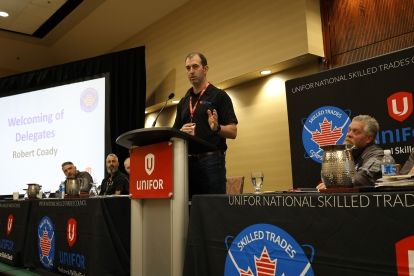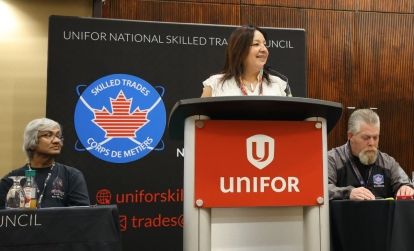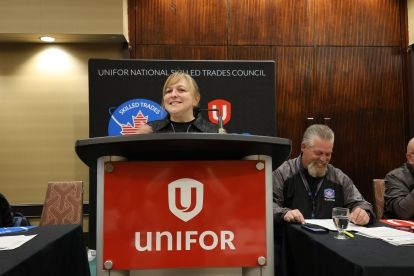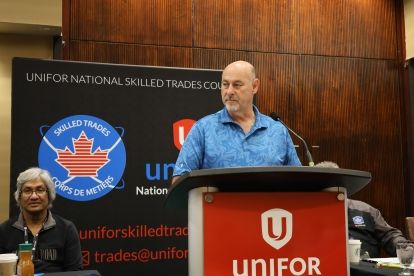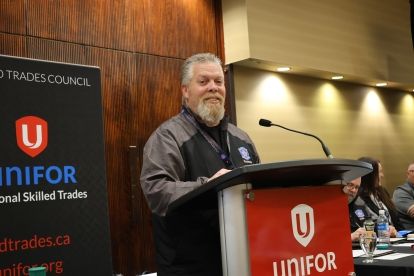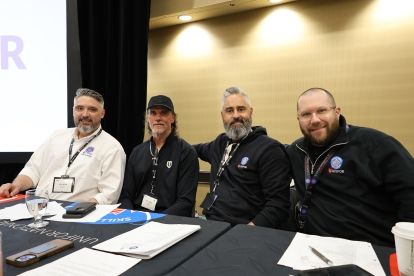
Share
More than 125 Skilled Trades delegates, observers, and Unifor staff from across Canada came together from May 23 to 25 in St. John’s, Newfoundland for the National Skilled Trades Council. What unfolded was a passionate, pointed, and powerful exchange of ideas, solutions, and solidarity amid rising challenges — including the escalating trade war.
On opening evening, Unifor Local 2121 President Robert Coady welcomed delegates to the Council, arriving shortly after being flown by helicopter from his workplace on the Hibernia offshore production platform.
Coady’s words set the tone for the days ahead: one of commitment and momentum. That spirit was echoed in the day's positive developments, including news that SeaRose offshore oil refinery workers had voted to join Unifor.
Gina Smoke, Unifor’s Indigenous Relations Director, grounded the meeting with a reflection on place and purpose. She provided information on Unifor’s Turtle Island course and spoke about the significance of Territorial Acknowledgements, emphasizing the importance of recognizing and showing gratitude for the land—whether it provides employment, forest, or water—and considering the gifts it offers.
Unifor Atlantic Regional Director Jennifer Murray delivered a rallying cry: “We know we have work to do every day at bargaining tables to safeguard the Skilled Trades, to make sure your work is valued and protected from employers watering down standards and eroding your jobs. Unifor has a role to play as a fighting force for promoting the Skilled Trades as an attractive and viable career option.”
Her message was one of empowerment, urging each delegate to “see yourself in your union — and use your unique skills and voice to make a difference in your workplace, your community, and beyond.”
The second day brought with it elections and fresh energy. Leanne Marsh from Local 2200 was acclaimed as Member-at-Large, and Scott Pearce from Local 222 took on the role of Sergeant-at-Arms. Together, they joined a Council Executive deeply committed to advancing the Skilled Trades in a changing and often uncertain economic landscape.
A major highlight came with the announcement from National Secretary-Treasurer Len Poirier that Unifor is investing in the future through a four-year partnership with Sheridan College, contributing $125,000 annually to the "Fueling the Future of Skilled Trades" initiative.
The support will increase student capacity, upgrade or expand many offerings at the College and directly enhance programs in Millwrighting, Electrical, Plumbing, Machining, and Welding.
Skilled Trades members were commended for their contributions to charity and community work, with Poirier noting, “The work and projects you and the Skilled Trades Council have all contributed have made communities across Canada a better place and Unifor proud.”
He then urged delegates to keep dreaming big: “It is up to us to imagine it, to organize for it and to bring it to life through worker power.”
Ken Anderson, National Skilled Trades Chairperson, spoke bluntly about the growing challenges ahead.
“We’re facing real threats from U.S. tariffs, but the Council stands united,” Anderson said, emphasizing Unifor’s commitment to protecting and preserving Canadian jobs. “You have the full support of the Skilled Trades. We will come where and when required and do whatever it takes.”
He also passionately highlighted the rise of women in Skilled Trades, celebrating their determination: “No one handed them the opportunity — they took it themselves.”
Anderson also championed apprenticeships as essential for long-term sustainability in the trades. “We need to move away from pre-apprenticeships. Let’s put real apprenticeships on the radar of every employer. If we don’t invest today, there won’t be journeypeople tomorrow.”
Unifor National Skilled Trades Director John Breslin took aim at systemic issues.
““There are people who are living in hope that they can get an apprenticeship,” said Breslin. “The EI system is failing. Students can’t enter apprenticeships if they can’t afford to live. We need structural change — now.”
In the background of all these discussions loomed the broader pressures of the trade war and government policy. In the Delegates Reports strong concerns were expressed that federal aid to automakers and manufacturers must come with strings attached: enforceable commitments, detailed plans, and real timelines.
Other pressing concerns raised in the reports included:
- Retention and recruitment of Skilled Trades workers amid increasing attrition.
- Rail sector frustrations, including scheduling issues tied to federally mandated sick days, invasive surveillance, and fears of privatization along VIA Rail’s high-frequency corridor.
- Qualification standard protections and the precarious situation of foreign workers tied to employers with the power to deport them.
The Bob Chernecki Charity of Choice was awarded to the Jacob Puddister Memorial Foundation, along with a $4,000 Council donation to support its efforts in providing mental health resources to youth in Newfoundland and Labrador and combating mental health stigma.
As the Council drew to a close, there was no mistaking the urgency in the air — but also no doubt in the delegates’ resolve. They departed St. John’s stronger, clearer, and more connected than ever.
The next Unifor National Skilled Trades Council will reconvene in Toronto, November 20-22, 2025 — and the fight to protect and empower Skilled Trades workers will continue.
View the St. John’s National Skilled Trades Council photo gallery here.



